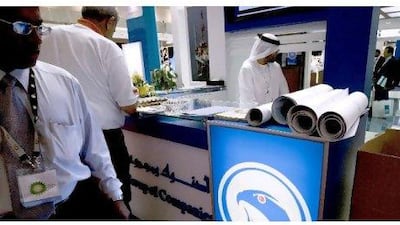Once every two years in the capital, the GCC's state oil companies offer a glimpse of future plans to 40,000 visitors.
The Abu Dhabi International Petroleum Exhibition and Conference (ADIPEC) remains the most popular energy event in the region and starts tomorrow amid burning questions about the oil industry's ageing fields, a local skills shortage and the future make-up of foreign partnerships.
The event's high-profile speakers will include top executives from national oil companies and international giants such as ExxonMobil.
It will stick to a central theme advanced by the oil industry for decades: that new technology will offer an answer to most of the challenges facing the production and use of oil and gas today.
Worries about an imminent peak in output from the world's oilfields could be allayed by new technologies that lift the proportion of crude recovered from ageing reservoirs.
The impact of carbon emissions on the atmosphere would be cut dramatically if energy companies could just figure out a simpler and more cost-effective way to divert them underground.
For the Abu Dhabi National Oil Company (ADNOC), ADIPEC is as an opportunity to explore new forms of technology needed in its fields, said Abdul Munim al Kindy, the general manager of ADNOC's onshore division ADCO and the chairman of the conference.
"ADIPEC, as we see it at ADNOC, is an important opportunity for us to get an insight into the new technology in the region," Mr al Kindy said last week.
"It is also an opportunity for our engineers to discuss their experience in a forum from different parts of the world."
For ADNOC in particular, the event comes at a crucial juncture. Some of the company's biggest fields are well into middle age, forcing the company to invest in new technologies to maintain output.
It is also beginning to develop expensive marginal fields that require more sophisticated production strategies to yield large profits, and is experimenting with the injection of carbon dioxide into its reservoirs as part of Abu Dhabi's plan to build a huge carbon storage network.
"We have 37 panel sessions that will deal with a wide range of subjects catering to everybody's interests in the oil industry," Mr al Kindy said. "The depth of the subject matter is growing with ADNOC."
The cost of producing oil at new fields and with new types of techniques could rise to as much as US$30 a barrel, he said. Output costs at ADNOC's oldest fields, by contrast, have been estimated at between $1 and $2 a barrel.
ADNOC and the UAE are not alone in facing these challenges. All five other GCC states have begun to implement advanced extraction methods to squeeze more oil out of maturing reservoirs. They are separately spending billions of dollars to tap into difficult gasfields.
At the same time as it tackles these new challenges, ADNOC is also looking to boost output capacity by 25 per cent to 3.5 million barrels per day and it is now reviewing the future of concession agreements with foreign oil companies that expire in 2014 and 2018.
The expansion in the company's operations will require many new workers, a further draw for delegates at ADIPEC, Mr al Kindy said.
ADNOC's deputy director of human resources, Badria Khalfan, will discuss the challenge of developing and retaining a talented workforce with executives from Saudi Aramco, BP and ExxonMobil.
"ADIPEC is an opportunity for us to target potential employees - there are lots of visits from students," Mr Khalfan said. "We try to motivate as many as we can to join the industry."
Abu Dhabi's energy plans are the focus of a pre-ADIPEC forum today in the capital that includes a number of senior executives from international oil companies.
The forum will evaluate the emirate's energy plans under its 2030 plan and "produce an 'Abu Dhabi Declaration' on the basis of discussions carried out at the conference", organisers said yesterday.
"The industry's movers and shakers will converge to examine and dissect the current trends in energy price, investments and assurance and address future energy challenges," said Hifazat Ahmad, the director of ADIPEC.
"This forum will be a meeting of some of the most expert minds in the industry."

